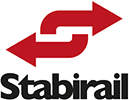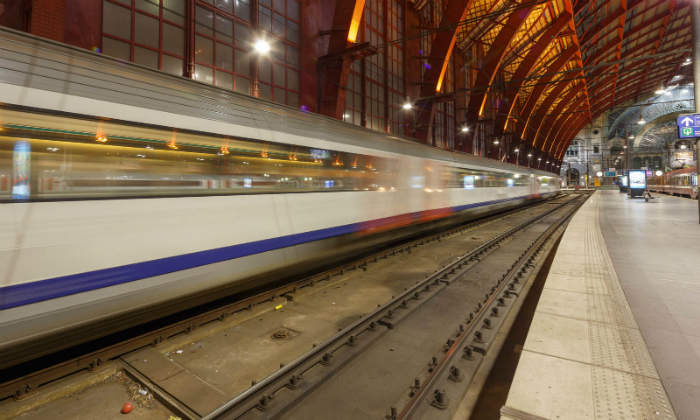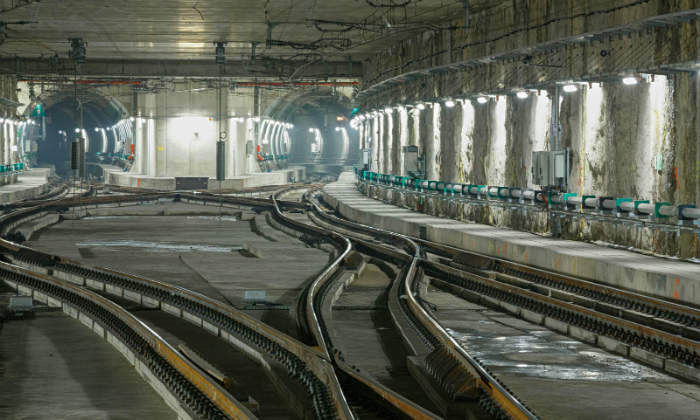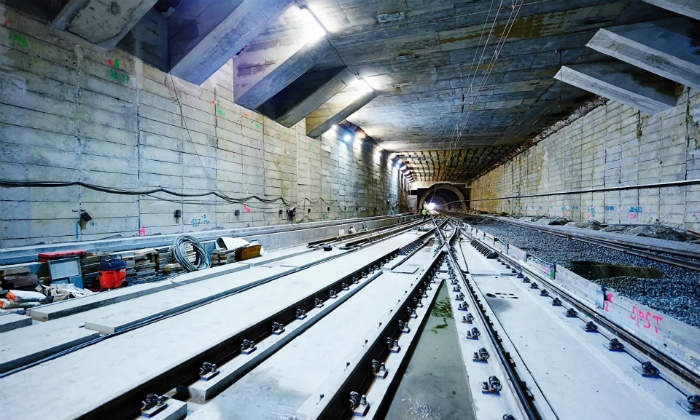
Stabirail performs ‘bottom-up’ slab track construction, which has proven to be the most efficient method for constructing railways in tunnels and over bridges.
Also referred to as ballastless track, slab track offers a number of advantages over traditional rails, including enhanced stability, reduced deformation and a lower construction height.
Bottom-up slab track construction for railways
Stabirail has designed and developed a new and improved method for ‘bottom-up’ slab track construction. In comparison to traditional ‘top-down’ slab track construction methods, the rails can be attached directly to the concrete bedding, thus allowing faster construction times and higher accuracy.
Stabirail’s unique method for slab track construction
Stabirail’s method for laying slab track involves three autonomously operated machines being used consecutively. First up is the concrete milling machine. Our new technology to mill concrete rail beds is designed to work with pinpoint accuracy. It’s a continuous process in which entire concrete blocks are milled simultaneously.
The machine is operated by a state-of-the-art 3D system and is capable of working on parabolic transitional curves and transitional slopes. In addition, the system’s diamond discs are water-cooled to prevent dust formation during the milling procedure. Cooling water is provided by a 10,000l capacity tanker, and reused after sludge created by the process has been separated.
Following the concrete milling machine, the drilling train passes through. This machine makes diamond-core drilled holes in the freshly milled concrete bed. These holes will be used to anchor the track afterwards. As the drilling is carried out with a water-cooled diamond drill, vibrations passed to the surroundings are kept to a minimum and there is no dust formation.
Finally, a third machine is used to anchor the track through the newly drilled holes. The train consists of an anchoring unit and a driving unit, with the latter section including a generator, water tank, air compressor and a hydraulic crane.
Advantages of ballastless track
Stabirail’s fast-working railway construction train is operated by a modern 3D system, which allows for accuracy within a 2mm range. Ballastless track can be constructed at a lower height, which is advantageous in tunnels where headroom is limited, and also creates a reduced dead load.
Stabirail produces a more stable track bed for high-speed trains. The tracks are also low-maintenance, with numerous installations where little or no repairs have been carried out over the last 25 years.
Over its 60-year lifespan, Stabirail’s ballastless track offers reduced maintenance costs compared to traditional rails.
Slab track construction on bridges
Stabirail’s ground-breaking ‘bottom-up’ method for laying slab track prevents longitudinal rail movement, one of the most commonly encountered problems when laying slab track on bridges.
In traditional ‘top-down’ methods, the rails are put in place first. When pouring concrete, the total weight of the construction increases significantly, causing bridges to sag and tracks to move. With Stabirail’s method, concrete is poured before the rails are put in place so that no extra weight is added to the construction, preventing bridges from sagging and eliminating longitudinal movement.
Construction of ballastless track in tunnels
Tunnels are especially suitable for slab track construction, because the underground is usually stiff and stable. The application in tunnels is efficient in terms of railway construction, durability, strength and costs.
Using Stabirail’s new and improved method for railroad construction, slab track can be assembled directly on the concrete bed, reducing dead load. Our railway construction train is operated by a state-of-the-art 3D system, which allows for accuracy within a 2mm range.
Consultants for slab track projects
Looking for a trustworthy and punctual partner for you slab track construction project? Look no further! Stabirail brings the necessary know-how and experience to the table to complete any slab track construction project with ease.
Slab track laying machines and training
Stabirail rents machines and provides necessary training for clients wishing to carry out track laying projects themselves. If you want to take full control over your project, the company provides customers with the option to buy one or more of its solutions.
Stabirail’s extensive experience allows it to provide detailed analysis and cost-effective options for slab track construction projects.







